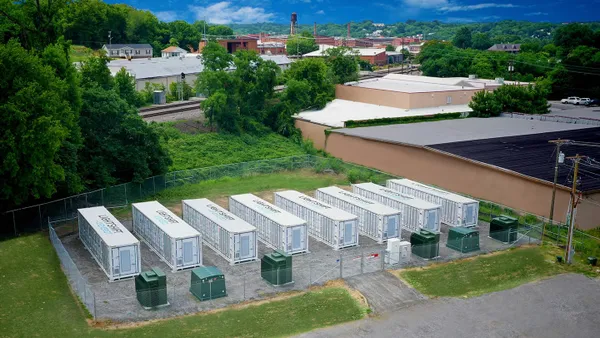UPDATE: Sept. 13, 2019: The CPUC Sept. 12 approved a $100 million resiliency program to support targeted deployment of energy storage systems in high fire threat areas. The systems will provide power when there's an outage or Public Safety Power Shutoff event due to high wildfire risk, the CPUC noted.
Dive Brief:
- The California Public Utilities Commission (CPUC) on August 9 issued a proposed decision that would create a new equity resiliency budget within the Self-Generation Incentive Program (SGIP), the state's primary incentive for energy storage.
- The proposal would transfer $100 million from SGIP's equity budget toward the new equity resiliency budget, which targets vulnerable households, critical services facilities and low-income solar program customers in Tier 3 high-fire-threat districts.
- Specifically, the budget aims for customers that are more likely to add a battery storage to their rooftop solar system than other low-income residents in California. The proposal could be voted on by the CPUC as early as next month.
Dive Insight:
Mitigating the risk and impact of wildfires will be a long battle for California. The state and utility companies are focused on resiliency to prevent another Camp Fire, which killed 85 people and caused an estimated $12.5 billion in damage last November.
Distributed energy resources (DERs), such as rooftop solar and battery storage, can help mitigate the impact of wildfires because they provide back up generation and don't rely on power lines, which sparked the 2018 fire.
Solar developer Sunrun, which has been using storage as an option to increase grid resiliency in Puerto Rico following the devastation of Hurricane Maria, is likely to benefit from the proposed new equity resiliency budget.
"Given the threat of wildfires to communities across California, we are committed to deliver rooftop solar and storage systems as part of the solution to address this challenge," Anne Hoskins, Sunrun's chief policy officer, told Utility Dive in an email.
She commended CPUC for proposing changes to SGIP's equity budget that focus on helping vulnerable households, especially low-income customers, in high wildfire threat communities.
SGIP's equity budget offers higher incentives than other programs for behind-the-meter battery installations, ranging from $0.35, up to $0.50 per watt-hour.
While the proposal only covers next year's SGIP budget, the CPUC said it plans to consider collecting up to $100 million annually to maintain funding.
CPUC also proposed establishing a $10 million budget for SGIP storage incentives to support pilot projects in 11 disadvantaged communities in San Joaquin Valley and a $4 million equity budget set-aside for heat pump water heater incentives.














